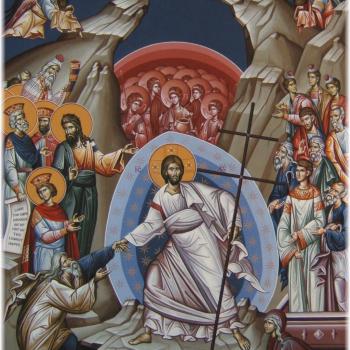
If for this life only we have hoped in Christ, we are of all people most to be pitied. But in fact Christ has been raised from the dead, the first fruits of those who have died. For since death came through a human being, the resurrection of the dead has also come through a human being; for as all die in Adam, so all will be made alive in Christ. But each in his own order: Christ the first fruits, then at his coming those who belong to Christ. Then comes the end, when he hands over the kingdom to God the Father, after he has destroyed every ruler and every authority and power. For he must reign until he has put all his enemies under his feet. The last enemy to be destroyed is death. (1 Corinthians 15:19-26, NRSV)
This week I heard a colleague who is both a pastor and theological educator say that he was certain that Jesus intended to save our world. But he wasn’t so sure about the next one. In fact, he said, the older I get, the less certain I am of the next life but I’m certain about this one.
I’ve heard pastors and educators make that claim in the past. I know a lot of Christians who have been taught to share their views. But why would clergy, of all people, make an argument of that kind?
There are a lot of reasons, I suppose. I’ve heard some argue that it makes the Christian message more palatable and easier for people to believe. Clergy – no less than anyone else – love to get through to people and long to be relevant. If the Resurrection is an obstacle, then why not set it aside?
I suspect that a lot of people also think that it makes them sound more sophisticated, better educated – what another generation described as “worldly wise”. Thomas Jefferson certainly thought so. In fact, he cut the Resurrection and the miraculous out of the Gospels and came up with what he believed was a great moral message.
And – of course – there is another reason that lies back of all these reasons: The conviction that what we don’t see can’t be true. Clergy – no less than a lot of laypeople – are wired to believe that what is real can be proved and how do you prove the Resurrection?
What is odd about this conclusion, however, is that we live by all kinds of truths that cannot be “proved” – the love of our parents and spouses; our love for our children, our children’s love for us; the importance of freedom; the existence of truth; the indispensable nature of virtue and trust; the inherent dignity of all people. And that’s just some of the “unprovable” truths we live by, many of them rooted in the Judaeo-Christian tradition.
In other words, the longer you ponder the way that those convictions and others undergird our lives, the clearer it becomes that provable, scientific truths aren’t descriptive of all that is most important. You may want to keep the law of gravity in mind if you are using a ladder, but it won’t help you much in determining the meaning of life.
Similarly, Paul isn’t arguing that he can “prove” the Resurrection – not in scientific terms, at any rate. But he is arguing that it is indispensable. And not just indispensable to the integrity of the Christian message but to the meaning of life itself.
So, from Paul’s point of view, the resurrection is a referendum on the meaning and value of life, the divide between hope and nihilism, the power of life over death, and – above all – the validity of God’s claim to be God. Or, to put it another way: Paul argues that if Jesus rose from the dead, then we can have confidence that both we and the world are in God’s merciful care. If he did not, we are completely without hope.
This is why Paul describes the Resurrection as the first phase in a cosmic conquest to destroy the power of death and restore meaning to life. He even uses the ancient Roman army’s technical language of “order”[1] to describe the stages of that conquest, arguing that God’s reclamation and rescue of both humankind and the world, begins with the Resurrection of Jesus, which is the watershed in God’s saving acts of grace. Then the resurrection is shared with “those who belong to Christ”. And after that follows the universal triumph of God’s kingdom.
Paul goes on to say that this conquest will only be complete after every ruler, authority, and power that pretends to be God is destroyed. Then, death, the last enemy and the biggest imposter of all will be destroyed. In a handful of lines, then, Paul offers an explanation of the events described in the Gospels and their significance for human life and existence, which – otherwise – would be without meaning.
What does this suggest about Easter and the church’s celebration of the Resurrection?
One, Easter is not the centerpiece of what Marx described as “the opium of the masses.
It is not the promise of eternal life in exchange for being a nice person and for ignoring the needs of others and the presence of evil in the world. It is not a nice fairytale for people who are afraid of dying. It is a worldview which defines the purpose of the world in terms of God’s redeeming love, which heals both our relationship with God and with one another. And the sacrificial love of Christ defines the nature of the sacrifice that we are called to make. There is no opium for Christians – Christians get a cross, not drugs.
Two, the Resurrection is not a metaphor for renewal.
Butterflies, bunnies, and Easter eggs are great diversions for children, especially if those children are fueled by large doses of chocolate. (That energy needs to be diverted somewhere.)
But Paul is pointed: If the Resurrection did not take place as it is described in the Gospels, then death wins. So, my colleague’s doubts about the Resurrection as both a present and future tense reality betrays a misunderstanding of the Christian message. Resurrection is not just about our destiny beyond the grave but a conviction that death itself must be conquered and the whole of creation reclaimed, if life is to have any meaning and God’s promises in Christ are of any validity.
And finally, there is this: The Resurrection is not an appendage to the theology of the church. Something nice to believe, if you like, but hardly necessary to the Christian faith.
Instead, Paul notes that the Resurrection is not just about life beyond the grave, but is the reclamation of heaven and earth; and, as such, it is the only guarantee of meaning, purpose, and value. So, without often recognizing it, Easter takes us straight into the question of whether life has any meaning at all.
This is a question that everyone should wrestle with, and I am surprised how many people don’t. It think that on some level there are a number of people who attend church on Easter, thinking this is just “stuff” that clergy are obliged to say. Or that clergy – like Paul – are simply trying to make choosing to embrace Christ as desperate a business as possible.
But, interestingly enough, even atheists are prepared to acknowledge that their “faith” – and it is a faith proposition – is just as desperate a place to live as Paul suggests. Christopher Hitchens, for example, a “new atheist” who died some years ago, argued that it was possible for life to have meaning but that meaning was entirely subjective, without grounding in anything transcendent and that such choices were made in the shadow of death, which swept it all away.[2] And, in recent years, Richard Dawkins, another “new atheist”, has been arguing that Christianity is good for civilization, even though he remains an atheist. But he does believe is that “human beings are just ‘throwaway survival machines’ whose only purpose is to survive and replicate genes.”[3]
So, if you read widely enough, the case for Resurrection is hardly a bit of religious hysteria. Instead, it is the invitation to live out of a serious worldview that argues we, life, and the universe have meaning because – in Christ – we, life, and the universe have a future.
It is my prayer that if you are already a Christian that – as you celebrate this day – you will live more deeply into that conviction. If you are not, I hope that you will weigh the value of that ancient path into the one, only life-affirming worldview that holds we are of value and that – in Christ – our lives are given enduring meaning and purpose.
Alleluia! Christ is risen. He is risen, indeed. Alleluia!
Notes:
[1] Richard B. Hays, First Corinthians, Interpretation: A Bible Commentary for Teaching and Preaching (Louisville: John Knox Press, 1997): 264-5).
[2] https://gospelproject.lifeway.com/life-meaning-apart-god/#:~:text=The%20individual%20creates%20meaning%20and,have%20mattered%20in%20the%20end.
[3] https://www.goodreads.com/quotes/8719428-humans-have-always-wondered-about-the-meaning-of-life-life
Photo by Pisit Heng on Unsplash















